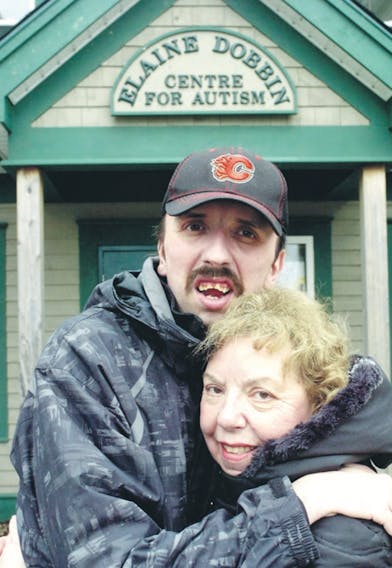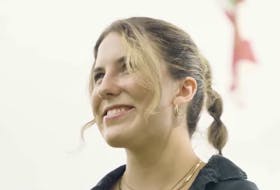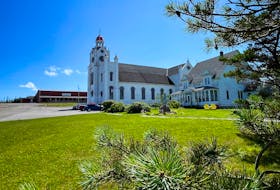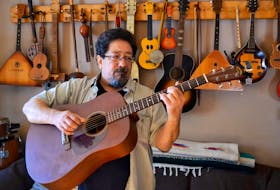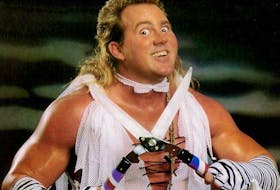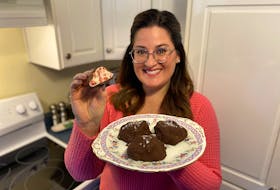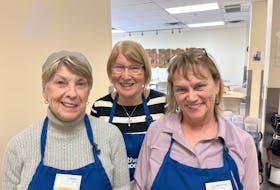ST. JOHN'S — Looking back, Joyce Churchill says she knew her son wasn't typical the moment she first held him as a newborn in hospital, 34 years ago.
He wasn't like her two older daughters, she said. He cried more. He was heavy and stiff in her arms. He'd squeeze his little eyes tight under bright lights, even if they were already shut.
"The more I learn, the more I think I could have probably diagnosed him before he even left the nursery," Churchill, now a retired nurse, said.
She first took her son, Stephen, to see a pediatrician when he was 10 months old, worrying that his eyes were crossed and that his head was a little bigger than it should have been.
The doctor told Churchill he saw nothing wrong with Stephen, but referred her to someone in childhood development, just to be sure.
When he was five, Stephen was diagnosed with autism. His mother went on to become president of the Autism Society of Newfoundland and Labrador, a position she held for almost 14 years, until she stepped down last fall.

"When I'd be in front of doctors and they'd say, 'I don't see anything wrong with him; you're expecting too much from him; he'll be fine; you're comparing him to your girls,' I was ever so glad to hear them say that, but I wouldn't be outside the door before I was shaking my head, saying, 'No, that's not right,"' Churchill said.
"When he was diagnosed, it certainly eliminated the frustration of all these assessments and not coming up with anything, but I think it was naive to be relieved, because, quite frankly, it's a horrendous diagnosis to get."
Autism spectrum disorder is a range of conditions characterized by difficulties with socialization and communication, and repetitive patterns of behaviour. Males are more likely to have autism than females, according to Autism Speaks Canada, and roughly one in every 110 children are diagnosed with the disorder.
There is no medical detection for autism, no known cure, and the cause has long been debated, with everything from genetics to childhood vaccines blamed.
This province's only neuropsychiatrist believes brain injury is at the root of the condition.
Dr. Hugh Mirolo runs the province's only neuropsychiatry clinic, at the Waterford Hospital in St. John's. While he doesn't treat children, he sees many adults with autism, and, at least clinically, many of their symptoms and treatments are the same as patients who have suffered a traumatic brain injury from a car accident or sports mishap, he said.
"I consider autism a brain injury until proven otherwise, and I treat it as such," Mirolo said. "I look at it as a post-traumatic brain injury syndrome."
A "perfect storm" situation is needed for autism to develop, Mirolo reckons: there must be a genetic component - a family history of autism - and a brain injury, typically sustained while the child is in the womb.
By brain injury, Mirolo doesn't necessarily mean a hit to the brain. It could be caused by a number of things, from undiagnosed hypertension or a viral infection in the mother in the first trimester of pregnancy, when the baby's brain is forming, to placenta previa (a complication which occurs when the placenta is located in the lower part of the uterus, sometimes resulting in in tearing and causing bleeding late in pregnancy).
"Because of that, the brain of that baby somehow was deprived of oxygen or some other vital substance, or there was some radical accumulation or something along those lines, and for that reason, the brain was hit the wrong way. Then it develops in a different way, which is autism," Mirolo explained.
A number of Mirolo's patients received brain traumas early in life, whether by having the umbilical cord wrapped around their neck upon delivery, delivery with the use of forceps or a serious fall within the first few years of life, and their symptoms are similar to those seen in autism, he said.
One thing Mirolo says doesn't cause autism is vaccine.

"That was a fluke," he said of the 1998 British study which linked the disorder to the measles, mumps and rubella vaccine. Last year, the medical journal that published the study - conducted by British surgeon and medical researcher Andrew Wakefield - retracted it, saying several elements of the study were incorrect.
"That was something that didn't have any sort of scientific validity, but it spread around the world like fire. It probably did quite a bit of damage, because people didn't want to give their kids any vaccines after that."
When it comes to preservatives in some vaccines, like mercury, Mirolo said while he knows of no clear study done to show or disprove a link between them and conditions like autism, he feels the benefits of vaccines outweigh the risks.
"I don't have a clear picture of the risk, but I do have a clear picture of the illnesses the vaccines prevent," he said.
It is hard to pinpoint what a patient's main brain injury in the womb might have been, Mirolo said, and it takes a lot of investigation. In many cases, it is never known for sure. Genetic predisposition is just as hard to uncover.
"If you say your grandpa or your great-grandpa had autism, how do we know? You don't know how much accuracy there is in that history. How do you know that diagnosis was correct? Even if it was correct, where on the spectrum were they? Was it autism or a brain injury at an early age?"
People with autism can further exacerbate their condition later in life, Mirolo said, since many of them engage in self-harming behaviour like hitting their head against objects. They're also, like everyone, at risk for car accidents or other incidents which can add to their problems.
Mirolo doesn't consider autism an entirely negative disorder. It's not that their brains function at a lower capacity than other people's; they just function differently, he explained, likening the condition to a computer with a different set of applications than others.
Churchill agrees with the theory that autism is a brain injury.
"Dr. Mirolo is putting a different light on this, and I have no quarrel with his approach - it is exactly a brain injury," she said.
"We've always known it's something wrong with the brain, and we still don't know what it is."
Her son Stephen has been a patient of Mirolo's since 2006, and his treatment includes medication, proper sleep hygiene measures and phototherapy sessions with a special lamp that replicates sunlight, Churchill said. Some days he seems to be responding well to the practices. Other days, not so much.
"When you don't know where in the brain the problem is and what causes it, it's more difficult," Churchill explained.
Stephen also attends programs at the autism society's Elaine Dobbin Centre for Autism six or seven hours each week, where he participates in a structured teaching program designed to cater to the specific and unique needs of a person with autism. The program incorporates life, social and communication skills, leisure activities and prevocational and pre-employment activities, including growing and selling flowers in the centre's greenhouse, helping out in the restaurant or taking part in music therapy.
The ultimate goal of the program, Churchill said, is to get people with autism out in the community, working and sustaining themselves.
Ultimately, Churchill said, the society would like to establish a centre for excellence in autism in this province.

